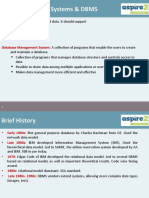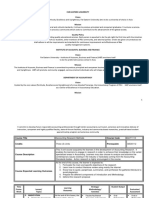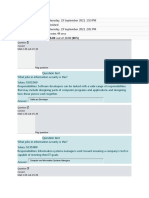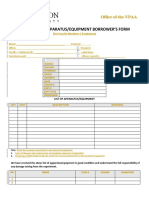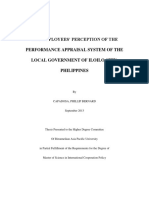University of Southeastern Philippines: COURSE SYLLABUS IN CDM 200: Basic Data Analytics
Uploaded by
JesalUniversity of Southeastern Philippines: COURSE SYLLABUS IN CDM 200: Basic Data Analytics
Uploaded by
JesalForm No.
FM-USeP-PRS-01
Republic of the Philippines
University of Southeastern Philippines Issue Status 05
Iñigo St., Bo. Obrero, Davao City 8000 Revision No. 04
Telephone: (082) 227-8192
Website: www.usep.edu.ph Date Effective 01 February 2021
Email: president@usep.edu.ph
Approved by President
COURSE SYLLABUS IN CDM 200: Basic Data Analytics
VISION INSTITUTIONAL GRADUATE ATTRIBUTES PROGRAM INFORMATION
Premier Research University in the ASEAN. LEADERSHIP SKILLS Program Graduate Outcomes Program Indicators
PGO 1. Capability to 1. Analyzed available information for planning
using participatory tools in defining community
Creates and inspires positive changes in the organization; exercises Strategize planning for needs and problems.
MISSION responsibility with integrity and accountability in the practice of one’s development 2. Utilized tools in developing development
programs and projects
profession or vocation. 3. Applied principles for results-based planning
USeP shall produce world-class graduates and relevant research and and management
CRITICAL AND ANALYTICAL THINKING SKILLS PGO 2. Capability to utilize 1.Identified the dynamics of key actors of
extension through quality education and sustainable resource development process
management. analysis tools for 2. Recognized the “rules of the game”,
Demonstrates creativity, innovativeness, and intellectual curiosity in development the local laws, conventions and traditions
GOALS optimizing available resources to develop new knowledge, methods, that shape development and planning
processes, systems, and value-added technologies. processes.
3. Integrated global influences, natural
resource endowment, demographic
At the end of the plan period, the University of Southeastern Philippines SERVICE ORIENTED shifts, historical legacies, social-cultural
factors and technological progress
(USeP) aims to achieve five comprehensive and primary goals: 1. Utilized research tools in problem
Demonstrates concern for others, practices professional ethics, honesty, PGO 5. Capability to employ
structuring and analysis prior to
1. Recognized ASEAN Research University and exemplifies socio-cultural, environmental concern, and data analytics for development interventions
2. ASEAN Competitive Graduates and Professionals sustainability. development interventions 2. Applied measurement tools for
development and planning
3. Vibrant Research Community 3. Employed strategies to create
4. Proactive Research-based Economic Empowering LIFELONG LEARNING
important business decisions or
Extension Services improving many simple operational
5. Capacity for Innovative Resource Generation Demonstrates enthusiasm and passion for continuous personal and decisions
professional development.
PROFESSIONAL COMPETENCE
Demonstrates proficiency and flexibility in the area of specialization and
in conveying information in accordance with global standards.
COURSE SYLLABUS in CDM 200-Basic Data Analytics
College of Development Management Page 1 of 6
inference and of the ethics of data analysis and statistics. Students will work in small groups in this course;
I. COURSE INFORMATION this will develop the skills required to work effectively and inclusively in groups, as in a real work
environment. Typically, one component of the assessment requires students to work in teams and collect
Course Code: CDM 200 and analyze data in order to answer a real-world problem of their own choosing.
Course Title: Basic Data Analytics
Pre-requisite None
Credit: 3 units
Level:
Semester/Year: First semester / AY 2021 -2022
Version number: 1
Faculty Information:
Course Description:
This course prepares the students to gather, describe, and analyze data using basic statistical tools. It helps Name: Roel F. Ceballos
students develop the understanding that they will need to make informed decisions using data, and to Email: roel.ceballos@usep.edu.ph
communicate the results effectively. The course therefore is an introduction to the essential concepts, tools Contact Number: 09327960164
and methods of statistics for students in development, governance, economics and similar disciplines. The Office: Department of Mathematics and Statistics, College of Arts and Sciences, USeP
course covers descriptive statistics that includes collecting data and summarizing and interpreting them Consultation Hours:
through numerical and graphical techniques. By the end of this course, students should understand and
know how to use statistics. Students will also develop some understanding of the limitations of statistical
COURSE SYLLABUS in CDM 200-Basic Data Analytics
College of Development Management Page 2 of 6
II. COURSE OUTCOMES (CO):
On the completion of the course, student is expected to be able to do the following:
Course Outcomes Graduate Outcomes Aligned to
CO1 Gather sufficient relevant data, conduct data analytics using scientific methods, and make appropriate and powerful connections between quantitative
PGO 2
analysis and real-world problems
CO2 Demonstrate a sophisticated understanding of the concepts and methods; know the exact scopes and possible limitations of each method; and show
capability of using data analytics skills to provide constructive guidance in decision making. PGO 5
CO3 Use advanced techniques to conduct thorough and insightful analysis, and interpret the results correctly with detailed and useful information.
PGO 2
CO4 Show substantial understanding of the real problems; conduct deep data analytics using correct methods; and draw reasonable conclusions with
PGO 5
sufficient explanation and elaboration
CO5 Write an insightful and well-organized report for a real-world case study, including thoughtful and convincing details. PGO 1
III. LEARNING EVIDENCES:
As evidence of attaining the above learning outcomes, the student has to do and submit the following:
Learning Evidence Description and other Details
LE Data Analytics Project Students shall individually produce a written article containing data analysis to aid in policy/decision making. The data may be obtained from either survey or records
from institutions.
IV. MEASUREMENT SYSTEM:
Learning Evidence: Data Analytics Project
LE1: ________________________________________________
Area to Assess Excellent Satisfactory Average Poor
All objectives are specific, measurable, and Most objectives are specific, measurable, and Some objectives are not specific, The objectives are not clear and
Objectives attainable and time bounded. attainable and time bounded. measurable, and attainable and time measurable.
bounded.
All Review of Related Literature and Studies Most of the Review of Related Literature and Some of the Review of Related Literature The Review of Related Literature and
Review of Related Literature are relevant to the study. Studies relevant to the study and Studies relevant to the study. Studies are not relevant to the study.
COURSE SYLLABUS in CDM 200-Basic Data Analytics
College of Development Management Page 3 of 6
All statistical methods are appropriate for Most of the statistical methods are Some of the statistical methods are All the statistical methods are
Methodology the given data and situation. appropriate for the given data and situation. appropriate for the given data and inappropriate for the given data and
situation. situation.
All results are thoroughly discussed, all Most results are thoroughly discussed, all Some results are thoroughly discussed, The results are not thoroughly
Results and Discussion,
objectives are addressed in the conclusion, objectives are addressed in the conclusion, some objectives are addressed in the discussed and objectives are not met
Conclusion and
and all appropriate recommendations are and appropriate recommendations are given. conclusion, and appropriate in the study and recommendations
Recommendation
given. recommendations are given. are inappropriate.
The presentation materials are well The presentation materials are well designed The presentation materials are well Presentation materials are not well
designed and all results are properly and all results are properly conveyed to the designed or some results are properly designed. The results are not properly
Oral Presentation
conveyed. In addition, presenters are audience. conveyed to the audience. conveyed to the audience.
articulate and confident.
V. OTHER REQUIREMENTS AND ASSESSMENT ACTIVITIES (AA)
Aside from the final output, the student will be assessed at other times during the term by the following:
Assessment Activity Description and other Details
AA1 Quizzes / Practical Exercises/Problem Sets/ Other Activities Quizzes and practical exercises outputs shall be collected and recorded
AA2 Major Exams As part of the formative dimension of the students, midterm and Final exam shall be administered. The assessment may be formative or
summative in form (Midterm and Final Examination). Final Examination may be replaced by the final paper.
VI. GRADING SYSTEM:
The final grade in this course will be composed of the following items and their weights in the final grade computation:
Assessment
Grade Source (Score or Rubric Grade) Percentage of Final Grade
Item
AA1 100 20
AA2 100 30
LE 100 50
Total 100
Passing Grade 75
Passing Grade conditions: For a student to pass this course he/she must be able to get at least a passing score that is 75% of the total scores in assessment
activities; submit all requirements on or before the set deadline. Incomplete (INC) grade may be given to a student if he/she fails to submit the outputs required in the Learning Evidence.
COURSE SYLLABUS in CDM 200-Basic Data Analytics
College of Development Management Page 4 of 6
VII. COURSE OUTLINE
In order to achieve the outcomes of this course, learners will go through this learning plan
Course Teaching-Learning Assessment Required
Intended Learning Outcomes (ILO) Weeks Topics Learning Evidences
Outcome Activities (TLA) Activities Reading
Books Milestone 1: Identified
On the completion of the course, the
Modules research problem and
student is expected to be able to:
Introduction Online Classes specify research questions to
Understand the definition of
CO2, Common Definitions of Analytics and Consultations Lectures answer.
Analytics 1 AA1
CO6 UVE notes
Define and identify the Analytics Roles and Competencies
Module State the sources of data.
different analytics roles and
competencies
On the completion of the course, the
student is expected to be able to: Some Statistical Softwares Online Classes
Get acquainted with the JASP and Consultations
commonly used soft wares AA1
R UVE
for analytics
Python Module
On the completion of the course, the Books Milestone 2: Write Review
student is expected to be able to: Basics of Descriptive Statistics Online Classes Modules of Related Literature and
Implement a data collection Methods of Data Collection and Consultations AA1 methodology
CO2 2
methods and sampling Sampling Techniques UVE AA2 Lectures
techniques in the conduct of Module notes Finalize research questions,
research. Identify possible methods of
Books analysis.
On the completion of the course, the
Online Classes Modules
student is expected to be able to: Basics of Inferential Statistics
and Consultations AA1 Midterm Exam
Use appropriate methods of CO3 3 Test on Means
UVE Lectures
statistical inference to answer Test on Proportions
Module notes
research questions.
Books
On the completion of the course, the Milestone 3: Perform Data
Data Presentation and Visualization Online Classes Modules
student is expected to be able to: Analytics and Write results
CO2 Summary Statistics and Consultations AA1
Present data in either tabular or 4-6 and discussions.
CO5 Data Visualization UVE Lectures
graphical form.
Dashboards Module notes
Discuss and interpret data.
COURSE SYLLABUS in CDM 200-Basic Data Analytics
College of Development Management Page 5 of 6
Course Teaching-Learning Assessment Required
Intended Learning Outcomes (ILO) Weeks Topics Learning Evidences
Outcome Activities (TLA) Activities Reading
Books
On the completion of the course, the
Regression Analysis Online Classes Modules Milestone 4: Write
student is expected to be able to:
Linear Regression and Consultations conclusions and
Analyze data using regression AA1
Survey of Nonlinear Regression UVE Lectures recommendations
methods.
Methods Module notes
Discuss and interpret results.
Books
On the completion of the course, the
Online Classes Modules Milestone 5: Presentation of
student is expected to be able to: Other Miscellaneous Methods
and Consultations Research
Analyze data using classification Clustering and Classification AA2
UVE Lectures
and clustering methods. Decision Trees
Module notes Final Exam
Discuss and interpret results.
VIII. REFERENCES/ARTICLES TO READ:
1. Almeda, J. V., Capistrano T. G., & Sarte, G. M. F. (2010). Elementary statistics. Quezon: The University of the Philippines Press.
2. Barrow, M. (2006). Statistics for economics, accounting, and business studies (4th ed.). London: Pearson Education Limited.
3. Matloff, N. (2011). The Art of R Programming. San Francisco: No Starch Press
4. Neter, J., Wasserman, W., & Kutner M. H. (1983). Applied linear regression models. Homewood: Richard D. Irwin, Inc.
5. Sampson, M.G. (2018). Statistical Analysis in JASP: A Guide for Students.
IX. CLASSROOM POLICIES:
1. Only students who are officially enrolled in the course are allowed to attend the online class. In case that a student is interested to sit in a particular class, he/she should ask approval from
the Department.
2. Students who encounter difficulty in their lessons must communicate with the instructor during online consultation time.
3. Collaboration for homework and class participation during online class discussion is highly encouraged.
4. All students should observe academic integrity. For many parts of the course, teamwork and use of modern technology are strongly encouraged and hence always indicate clearly the
intellectual ownership. If the student is caught cheating, then automatically he/she gets a score of 0 for that quiz/exam.
Prepared by: Modified by: Reviewed by: Approved:
DR. REC E. EGUIA ROEL F. CEBALLOS, MSc. DR. ANALIZA P. AGUILAR DR. EULALIO C. PATAYON
Faculty Associate Dean OIC-Dean
COURSE SYLLABUS in CDM 200-Basic Data Analytics
College of Development Management Page 6 of 6
You might also like
- 2023 OBE Syllabus Business Office Management and TechnologyNo ratings yet2023 OBE Syllabus Business Office Management and Technology14 pages
- Destination Competitiveness An Analysis of Determinant AttributesNo ratings yetDestination Competitiveness An Analysis of Determinant Attributes20 pages
- An Information System Strategic Plan (ISSP) : University of The Philippines VisayasNo ratings yetAn Information System Strategic Plan (ISSP) : University of The Philippines Visayas36 pages
- North Luzon Philippines State College: Revised/Enhanced in August 05, 2020No ratings yetNorth Luzon Philippines State College: Revised/Enhanced in August 05, 20209 pages
- 2023 OBE Syllabus - Medical Office ProceduresNo ratings yet2023 OBE Syllabus - Medical Office Procedures26 pages
- BSA Business Statistics Course Syllabus For EditingNo ratings yetBSA Business Statistics Course Syllabus For Editing6 pages
- La Salette of Roxas College, Inc.: Information Technology DepartmentNo ratings yetLa Salette of Roxas College, Inc.: Information Technology Department7 pages
- CMO No. 05 S. 2018 PSG For BS Criminology PDFNo ratings yetCMO No. 05 S. 2018 PSG For BS Criminology PDF19 pages
- 15 CMO 25 s2015 Revised PSGs For BSCS BSIS and BSIT ProgramsNo ratings yet15 CMO 25 s2015 Revised PSGs For BSCS BSIS and BSIT Programs57 pages
- Suc Prexc 2018 Indicators 4.12.2017 - Ver1No ratings yetSuc Prexc 2018 Indicators 4.12.2017 - Ver17 pages
- OBTLP - CC 2104 - Applications Development and Emerging TechnologiesNo ratings yetOBTLP - CC 2104 - Applications Development and Emerging Technologies6 pages
- Soc Sci 104 - Basic Econ - Course OutlineNo ratings yetSoc Sci 104 - Basic Econ - Course Outline2 pages
- Information Assurance and Security 2 QuizNo ratings yetInformation Assurance and Security 2 Quiz5 pages
- Course Outline (Data Communication and Networking 1)No ratings yetCourse Outline (Data Communication and Networking 1)3 pages
- Undergraduate Thesis and Project Guidelines100% (1)Undergraduate Thesis and Project Guidelines6 pages
- Obe Syllabus Cs 111 - Discrete Structures 1 v1No ratings yetObe Syllabus Cs 111 - Discrete Structures 1 v111 pages
- Course Name System Analysis and Design Course DescriptionNo ratings yetCourse Name System Analysis and Design Course Description2 pages
- CMO-07s2010 Revised Guidelines For Graduate ITE ProgramsNo ratings yetCMO-07s2010 Revised Guidelines For Graduate ITE Programs29 pages
- Chapter 3 (A) Professional Ethics ResponsibilitiesNo ratings yetChapter 3 (A) Professional Ethics Responsibilities48 pages
- Capstone Project Application For Proposal Defense FormNo ratings yetCapstone Project Application For Proposal Defense Form2 pages
- Updates in Information System I: Aispre 10No ratings yetUpdates in Information System I: Aispre 1011 pages
- Information Assurance and Security 1 Prelim ExamNo ratings yetInformation Assurance and Security 1 Prelim Exam20 pages
- It201-Human Computer Interaction - CaloNo ratings yetIt201-Human Computer Interaction - Calo14 pages
- 15 - CMO - 25 - s2015 - Revised PSGs For BSCS BSIS and BSIT Programs PDFNo ratings yet15 - CMO - 25 - s2015 - Revised PSGs For BSCS BSIS and BSIT Programs PDF57 pages
- Borrower's Slip (For Faculty&Employees) 2No ratings yetBorrower's Slip (For Faculty&Employees) 22 pages
- Inte 30013 Bsit Obe Format Programming 3 Structured ProgrammingNo ratings yetInte 30013 Bsit Obe Format Programming 3 Structured Programming6 pages
- CHED Memorandum Order For Practicum ProgramNo ratings yetCHED Memorandum Order For Practicum Program7 pages
- Score Sheet in Thesis/Capstone Oral Defense: AMA University100% (1)Score Sheet in Thesis/Capstone Oral Defense: AMA University1 page
- MBBA327L_Business Analytics_2023-24 Odd SemesterNo ratings yetMBBA327L_Business Analytics_2023-24 Odd Semester9 pages
- Buma 30083 - Fundamentals of Prescriptive Analytics 1No ratings yetBuma 30083 - Fundamentals of Prescriptive Analytics 14 pages
- Assessment of Eating Habits and Lifestyle During The Coronavirus 2019 Pandemic in The Middle East and North Africa Region: A Cross-Sectional StudyNo ratings yetAssessment of Eating Habits and Lifestyle During The Coronavirus 2019 Pandemic in The Middle East and North Africa Region: A Cross-Sectional Study10 pages
- Briefing On Ambisyon Natin 2040, Philippine and Caraga Regional Development Plans 2017-2022No ratings yetBriefing On Ambisyon Natin 2040, Philippine and Caraga Regional Development Plans 2017-202261 pages
- General Steps of Test Construction in Psychological TestingNo ratings yetGeneral Steps of Test Construction in Psychological Testing13 pages
- Corporate Social Responsibility of Resorts: A Case of Pansol, Laguna, PhilippinesNo ratings yetCorporate Social Responsibility of Resorts: A Case of Pansol, Laguna, Philippines11 pages
- Analysis of Overhead Costs Management in CompaniesNo ratings yetAnalysis of Overhead Costs Management in Companies11 pages
- A Comparison of The Power of The T Test Mann-KendaNo ratings yetA Comparison of The Power of The T Test Mann-Kenda19 pages
- Inter-Regional Disparities in Industrial Growth and StructureNo ratings yetInter-Regional Disparities in Industrial Growth and Structure100 pages
- ARLINDA S. BONGCALON-Policy - Analysis - & - Decision - MakingNo ratings yetARLINDA S. BONGCALON-Policy - Analysis - & - Decision - Making23 pages
- Chapters-4 Explorartory Research Design - Secondary DataNo ratings yetChapters-4 Explorartory Research Design - Secondary Data23 pages
- The Employees' Perception of The Performance Appraisal System of The Local Government of Iloilo City, PhilippinesNo ratings yetThe Employees' Perception of The Performance Appraisal System of The Local Government of Iloilo City, Philippines126 pages
- General Direction: Please Respond To Following Questions by Putting Check (No ratings yetGeneral Direction: Please Respond To Following Questions by Putting Check (4 pages
- 2023 OBE Syllabus Business Office Management and Technology2023 OBE Syllabus Business Office Management and Technology
- Destination Competitiveness An Analysis of Determinant AttributesDestination Competitiveness An Analysis of Determinant Attributes
- An Information System Strategic Plan (ISSP) : University of The Philippines VisayasAn Information System Strategic Plan (ISSP) : University of The Philippines Visayas
- North Luzon Philippines State College: Revised/Enhanced in August 05, 2020North Luzon Philippines State College: Revised/Enhanced in August 05, 2020
- BSA Business Statistics Course Syllabus For EditingBSA Business Statistics Course Syllabus For Editing
- La Salette of Roxas College, Inc.: Information Technology DepartmentLa Salette of Roxas College, Inc.: Information Technology Department
- 15 CMO 25 s2015 Revised PSGs For BSCS BSIS and BSIT Programs15 CMO 25 s2015 Revised PSGs For BSCS BSIS and BSIT Programs
- OBTLP - CC 2104 - Applications Development and Emerging TechnologiesOBTLP - CC 2104 - Applications Development and Emerging Technologies
- Course Outline (Data Communication and Networking 1)Course Outline (Data Communication and Networking 1)
- Course Name System Analysis and Design Course DescriptionCourse Name System Analysis and Design Course Description
- CMO-07s2010 Revised Guidelines For Graduate ITE ProgramsCMO-07s2010 Revised Guidelines For Graduate ITE Programs
- Chapter 3 (A) Professional Ethics ResponsibilitiesChapter 3 (A) Professional Ethics Responsibilities
- Capstone Project Application For Proposal Defense FormCapstone Project Application For Proposal Defense Form
- 15 - CMO - 25 - s2015 - Revised PSGs For BSCS BSIS and BSIT Programs PDF15 - CMO - 25 - s2015 - Revised PSGs For BSCS BSIS and BSIT Programs PDF
- Inte 30013 Bsit Obe Format Programming 3 Structured ProgrammingInte 30013 Bsit Obe Format Programming 3 Structured Programming
- Score Sheet in Thesis/Capstone Oral Defense: AMA UniversityScore Sheet in Thesis/Capstone Oral Defense: AMA University
- Buma 30083 - Fundamentals of Prescriptive Analytics 1Buma 30083 - Fundamentals of Prescriptive Analytics 1
- Assessment of Eating Habits and Lifestyle During The Coronavirus 2019 Pandemic in The Middle East and North Africa Region: A Cross-Sectional StudyAssessment of Eating Habits and Lifestyle During The Coronavirus 2019 Pandemic in The Middle East and North Africa Region: A Cross-Sectional Study
- Briefing On Ambisyon Natin 2040, Philippine and Caraga Regional Development Plans 2017-2022Briefing On Ambisyon Natin 2040, Philippine and Caraga Regional Development Plans 2017-2022
- General Steps of Test Construction in Psychological TestingGeneral Steps of Test Construction in Psychological Testing
- Corporate Social Responsibility of Resorts: A Case of Pansol, Laguna, PhilippinesCorporate Social Responsibility of Resorts: A Case of Pansol, Laguna, Philippines
- Analysis of Overhead Costs Management in CompaniesAnalysis of Overhead Costs Management in Companies
- A Comparison of The Power of The T Test Mann-KendaA Comparison of The Power of The T Test Mann-Kenda
- Inter-Regional Disparities in Industrial Growth and StructureInter-Regional Disparities in Industrial Growth and Structure
- ARLINDA S. BONGCALON-Policy - Analysis - & - Decision - MakingARLINDA S. BONGCALON-Policy - Analysis - & - Decision - Making
- Chapters-4 Explorartory Research Design - Secondary DataChapters-4 Explorartory Research Design - Secondary Data
- The Employees' Perception of The Performance Appraisal System of The Local Government of Iloilo City, PhilippinesThe Employees' Perception of The Performance Appraisal System of The Local Government of Iloilo City, Philippines
- General Direction: Please Respond To Following Questions by Putting Check (General Direction: Please Respond To Following Questions by Putting Check (




